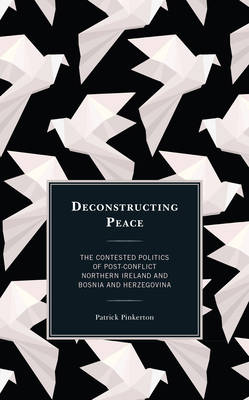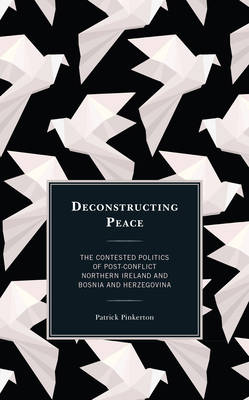
- Afhalen na 1 uur in een winkel met voorraad
- Gratis thuislevering in België vanaf € 30
- Ruim aanbod met 7 miljoen producten
- Afhalen na 1 uur in een winkel met voorraad
- Gratis thuislevering in België vanaf € 30
- Ruim aanbod met 7 miljoen producten
Zoeken
Deconstructing Peace
The Contested Politics of Post-Conflict Northern Ireland and Bosnia and Herzegovina
Patrick Pinkerton
€ 113,45
+ 226 punten
Uitvoering
Omschrijving
This book develops a novel approach to peace and conflict studies, through an original application of the philosophy of Jacques Derrida to the post-conflict politics of Northern Ireland and Bosnia and Herzegovina. Based on new readings of the peace agreements and the post-conflict political systems, the book goes beyond accounts that present a static picture of 'fixed divisions' in these cases. By exploring how formal electoral politics and the informal political spheres of artistic, cultural, judicial and protest movements already contest the politics of division, the book argues that the post-conflict political systems in Northern Ireland and Bosnia and Herzegovina are in a process of deconstruction. The text adds to the Derridean lexicon by developing the idea of a 'deconstructive conclusion', which challenges historical understandings of conflicts at the same time as challenging their consequences in the present. The study provides a critical contribution to peacebuilding and International Relations literature, by demonstrating how Derridean concepts can be utilised to provide fresh understandings of conflict and post-conflict situations, as well as allowing for political interventions to be made into these processes.
Specificaties
Betrokkenen
- Auteur(s):
- Uitgeverij:
Inhoud
- Aantal bladzijden:
- 194
- Taal:
- Engels
- Reeks:
Eigenschappen
- Productcode (EAN):
- 9781786614070
- Verschijningsdatum:
- 1/04/2021
- Uitvoering:
- Hardcover
- Formaat:
- Genaaid
- Afmetingen:
- 152 mm x 229 mm
- Gewicht:
- 453 g

Alleen bij Standaard Boekhandel
+ 226 punten op je klantenkaart van Standaard Boekhandel
Beoordelingen
We publiceren alleen reviews die voldoen aan de voorwaarden voor reviews. Bekijk onze voorwaarden voor reviews.







